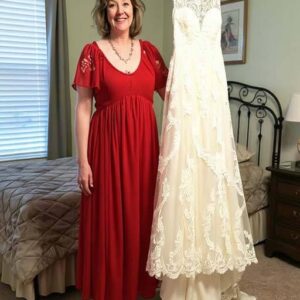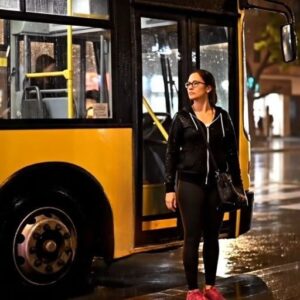
He was meant to be honored, not deserted. Yet my 74-year-old grandfather waited alone at checkout, clutching a $12,000 invoice he never agreed to. They assumed he wouldn’t speak up—until I arrived.
The front doors opened. My shoes struck the tile. The scent of sunscreen and flowers filled the air. I saw him—my grandfather—standing still, shoulders slumped, gripping a thick document with both hands. It trembled slightly.
“They told me it was their gift,” he whispered. “I didn’t want to cause trouble.”
They believed he wouldn’t say anything. They didn’t expect me to arrive.
Two months prior, Grandpa had retired. He was 74. He had spent 52 years working as a machinist. He rarely missed work unless sick, and even then, he called to check on things.
He was reserved. Old-fashioned. The type of man who repaired your broken shelf without being asked and left a $20 bill on your counter “for lunch.”
Every birthday, he brought a card and some cash. He never forgot a face. He always gave. Never asked for anything.
My aunt—his daughter—said we should do something special for his birthday. My cousin Ashley got excited.
“Let’s take Grandpa somewhere nice,” she suggested. “Like a beach resort. Real luxury.”
Everyone agreed. We planned a week at a coastal, all-inclusive hotel. Ashley handled all the bookings. She reserved five rooms. She chose a suite with a private balcony just for Grandpa.
“He deserves it,” she said. “He’s done everything for us. Now it’s his turn to rest.”
They assured him money was no object.
“It’s our gift, Grandpa,” Ashley smiled widely.
He hesitated. “Are you sure? I don’t want to be a burden.”
“Don’t be silly,” she replied. “You’re the reason we’re here.”
He packed his single suitcase, grabbed his fishing hat, put on sandals—first time in ten years—and we headed out.
The photos started on day one. Poolside selfies. Fancy drinks. Room service. Hashtags like #FamilyFirst and #CelebratingTheKing.
I couldn’t join right away—the work kept me in the city—but I booked a one-way flight to meet him. He didn’t like airports, said they made him feel lost.
When I arrived, the sun shone brightly. Palm trees swayed in the breeze. I stepped into the hotel with a grin.
That grin disappeared instantly.
Grandpa, alone. Bill in hand. Suitcase by his side. Everyone else gone.
“They told me it was all paid,” I said, voice trembling.
He nodded slowly. “That’s what I thought, too. But this morning, they started packing up. Said checkout was at noon. Said they were heading to the airport.”
He paused. “Ashley told me I just needed to go to the desk and sign something.”
The invoice broke down all charges. Room fees. Spa treatments. Cocktails. Boat rentals. Champagne. Every item billed to his suite.
“Why didn’t you call me?” I asked.
He shrugged. “I didn’t want to bother you. I thought… I might have enough in savings.”
His eyes looked at the ground.
“I didn’t want to make a fuss,” he said. “The important thing is… they had fun.”
I looked at him, then at the bill. My fists clenched.
“I’ll be right back,” I said.
Outside, I pulled out my phone.
I dialed Ashley’s number. She answered after the second ring.
“Hey, cousin!” she greeted cheerfully.
My voice was flat. “Why did you leave Grandpa with a $12,000 bill?”
There was a pause. Then she giggled.
“Are you serious?” I asked, already knowing I wouldn’t like her answer.
“Oh, come on,” she said. “He’s retired. He has savings. He’s not struggling.”
I stayed silent.
She kept talking. “We thought he could treat us. He’s not supporting us anymore. This was like a thank-you trip from him to us.”
“You thought?” I snapped. “It’s okay to saddle a seventy-four-year-old man with a twelve-thousand-dollar bill without asking?”
She scoffed. “Relax. You know Grandpa. He’s happy just to see us together.”
I stared out at the road outside the hotel. My grip on the phone tightened. A valet pushed luggage past me. Laughter floated from the pool area.
“Let me make this clear,” I said. “He’s not the fool here. You are.”
She mocked. “Calm down. If it’s such a big deal, we’ll talk on Thanksgiving.”
Click.
I paused, breathing slowly. Grandpa’s voice faded behind me as he tried to explain to the front desk, still apologizing for their mistake.
I turned and went back inside.
I told Grandpa loudly enough for staff to hear, “Don’t worry. I’ve got this.”
He looked worried. “It’s a lot of money. I don’t want you—”
I raised my hand. “It’s taken care of.”
I used my card to pay the entire bill. The manager printed a receipt. As she handed it to me, I asked, “Can I get an itemized list of charges, per room?”
She nodded. “Of course.”
“I want everyone’s names, check-in and check-out times, and copies of all signatures.”
She didn’t ask why. She simply said, “I’ll email everything within an hour.”
I looked back at Grandpa. He was holding his suitcase again, still looking unsure. His shoulders tensed as if expecting to be scolded.
“I’m taking you home,” I said. “But first, we’re getting a milkshake.”
His slow smile returned. “You always liked the chocolate ones.”
That evening, I called my lawyer—an old friend from college. Very sharp. Doesn’t miss a detail.
I explained everything: the hotel, the bill, the abandonment.
“Send me what you have,” he said. “We’ll document it all.”
By morning, I had:
The detailed, itemized bill linked to each cousin’s name.
Security footage from the lobby showing them checking out, carrying their bags, without a backward glance.
Written statements from hotel staff confirming Grandpa was left behind and told he would pay the charges.
We drafted official letters.
They were polite but firm.
“You are responsible for the charges listed below. Payment is due within 14 days. If unpaid, I will pursue recovery in small claims court for fraud, elder financial abuse, and abandonment.”
Each letter printed the bill with their specific charges highlighted.
Ashley’s was the longest—champagne upgrades, couples massages, sunset cruises.
Then I sent Venmo requests. No hostility, just: “Your part of Grandpa’s retirement trip. Due in 14 days.”
No emojis, no smiley faces—just facts: clear, cold, unmistakable.
The first payment appeared three days later. Ashley paid in full—no apology, no note, only a silent transfer with a bitter emoji name. Then her brother, then my aunt. Slowly, reluctantly, they all paid.
No “thank you.” A few tried to argue.
“This is way over the top,” one said.
“You made it public,” another added.
“It was just a misunderstanding,” someone claimed.
I didn’t reply. Instead, I kept the records. The Venmo notes all read: “Your share of Grandpa’s trip.”
Two weeks later, the full $12,000 was recovered, except for Grandpa’s portion. I told my lawyer to leave his amount out.
One night at dinner, he looked at me and said, “You shouldn’t have done that.”
I answered, “I wanted to.”
He frowned. “But I could’ve paid. I have savings.”
“You shouldn’t have,” I said. “You earned that vacation. The rest isn’t your burden.”
He looked down at his coffee. He was silent for a moment.
Then he nodded once. “Alright. Thank you.”
Thanksgiving passed. No calls, no invitations.
Grandpa wasn’t surprised.
“One day, I’ll see who they really are,” he said one evening as we watched a western on TV. “Maybe it’s better that way. I was blind for too long.”
“You weren’t blind,” I replied. “You were just kind.”




